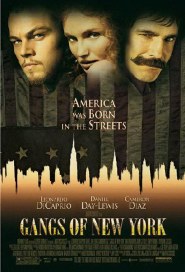cameron diaz movies
|
|
Chapter 6 - Amsterdam? I'm New York.
 Also in on the recreation of Old New York was dialogue coach Tim Monich, who had everyone on the set speaking like 19th century Lower Manhattanites – who had their own distinctive “New York Accent” and their own spectacularly imaginative criminal slang. This is where terms such as “crib” for a house or “fenced” for selling hot items, among many others, were born. Also in on the recreation of Old New York was dialogue coach Tim Monich, who had everyone on the set speaking like 19th century Lower Manhattanites – who had their own distinctive “New York Accent” and their own spectacularly imaginative criminal slang. This is where terms such as “crib” for a house or “fenced” for selling hot items, among many others, were born.Monich explains, “The challenge for us was to get the characters to sound like tough, street-wise, working class New Yorkers while staying away from any of the ethnic associations of modern day New York City.”
In addition to extensive research, Monich had to eventually rely in part on his own linguistic imagination. “The 1840s and 1860s are too early for recordings,” he says, “so I went back to period sources, humorous writings, poems, ballads, and newspaper clippings to get an idea of what New Yorkers sounded like in those days. I also listened to early recordings of people who were born and raised in the period, for instance a recording of Walt Whitman.”
Monich helped each actor to meld authentic speech characteristics with their character’s personalities. “Daniel Day-Lewis worked very hard on creating a unique manner of speech for Bill the Butcher,” he notes. “He decided that Bill was a literate person who knew how to read and write. So what did people read in those days? First of all, the Bible, so Daniel and I read the Bible aloud together, having the text shape some sounds. We also read Whitman. Daniel wanted to do something different with the rate of speech at which the Butcher spoke. We think of New Yorkers as speaking fast these days, but Daniel didn’t want to do that. He wanted to do something slow, deliberate. Marty found that very interesting.”
Continues Monich, “In the same way, Leo and I talked about Amsterdam’s background. Amsterdam came to America from Ireland, and was raised among Irish immigrants who may have spoken Gaelic, or English with a thick accent, so his speech probably acquired a lilt. But the 16 years he spent in the workhouse hardened his speech, so we came up this kind of hybrid American/Irish pronunciation. Cameron’s character was similar. She also came to America as a child and lived in the Five Points. But because she was taken in by the Natives at a young age, she acquired more naturally American speech patterns.”
Monich referred to himself as the ‘period pronunciation police’ on the set, but the concept was one of great leeway in order to create an impression of New York as a Tower of Babel. “Daniel occasionally inserted a Whitmanesque word into the dialogue, and also incorporated some biblical quotations,” Monich says. “And I’ll never forget the first time Leo improvised the word ‘Okay.’ As soon as Marty yelled ‘Cut,’ Leo came running over to apologize. ‘I’m sorry. I know I can’t say Okay,’ he said. ‘On ‘Titanic,’ they told me never to say it.’ I disagreed. Okay is a very old American expression, pre-dating the Civil War. There’s some dispute about its origin, but I believe it derives from a jocular way of saying ‘All Correct.’ I told him it was perfectly fine for him to use it.”
Monich’s task not only included working with the leads – he also had to keep track of the accents of all 100-plus speaking parts. “Almost no one on this film spoke with his or her real accent,” he observes. “We had Irishmen like Brendan Gleeson and Englishmen like Jim Broadbent playing Americans. On the other hand, there were Americans playing Irish immigrants. It was a stew of different accents, which is pretty much how it has always been in America.”
For her part, Diaz found working on her accent was one aspect of getting to the heart of her character. “Jenny came to America with her mother from Ireland and was orphaned at a very young age,” she comments. “She took up with Bill the Butcher and learned from him all she needs to know about surviving, whether it means selling her body or committing petty crime. She probably mimicked his speech patterns, too.”
Henry Thomas is another actor who came to a greater understanding of his character through language. “I read a book called The Rogue’s Lexicon, which is basically an encyclopedia of period slang from the underworld of the last century,” he explains. “It was really helpful getting a grip on the language, and it helped me see how authentic our script was. It’s fascinating how some words persist in the language today, such as ‘sharp’ as in ‘someone looks sharp.’”
Thomas never felt constricted by having to use an accent. “There was a lot of freedom for the actors to pick and choose where their character came from,” he comments. “New York is a melting pot, an amalgamation of every accent in the world, so it was very interesting to toy around with that.”
|